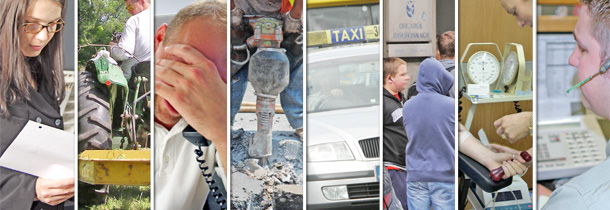31 March 2013 Edition
Sharing the burden?
Robbie Smyth peeks into some of the pay PACKETS of ‘the great and the good’ and what’s in it for the rest of us

• High earners: Bank of Ireland CEO Richie Boucher, RTÉ’s Marian Finucane, and former Taoisígh Bertie Ahern and Brian Cowen are all on huge salaries or pensions, courtesy of the taxpayer
In November 2012 it was revealed that there were still 3,000 bankers earning over €100,000 annually, 57 earn more than €150,000, and 27 people in our failed banks are earning more than €500,000 annually
SO HOW has your wage packet performed in the first three months of 2013? A bit lighter again? Maybe not if you are a Bank of Ireland CEO or one of his chums, a hospital consultant, or an RTÉ broadcaster lecturing us not to be greedy in these times of austerity.
By now the full effects of Budget 2013 will be felt in readers’ take-home pay if you are one of the 1,848,900 people at work in the 26 Counties. Maybe you are one of the 428,876 people signing on the live register in February without work.
The vast majority of households are worse off in 2013 than they were five years ago when an economic tsunami surged through the international and Irish economies. Average disposable income has fallen from €24,380 in 2008 to €21,440 in 2011. Central Statistics Office deprivation and poverty figures published in February showed a deprivation rate of 24.5% in 2011 compared to 11.8% in 2007.
According to the annual survey on income and living conditions, 12.2% went without heating at some stage in 2011, 21.1% were unable to afford a night out, 21.7% were unable to replace broken or worn-out furniture, 7.3% were unable to afford new clothes.
Average wages in 2010 were €32,930 according to a study published in January by PublicPolicy.ie, down from a high €36,240 in 2008. The study also reported a significant gender wage differential with an average wage for men of €37,623 in 2010 compared to an average of €28,196 for women.
The Public Policy report includes figures on high-earners and low-earners in Irish society with the lowest 20% of workers taking home a median annual pay of €7,227 compared to €60,698 for the top 20% in 2010. That translates to the top 20% of wage earners earning over eight times the lowest 20%.
The Public Policy figures also show that although 53% of workers are in the same earning range they were in 2006, 23% were worse off while 24% were doing better. Yes, nearly 1 in 4 workers have emerged with higher wages through the recession.
Another snapshot of wage disparities comes from the Revenue Commissioners’ Annual Statistical Report. The most recent data for 2011 shows that of the over 2million PAYE-liable workers in 2011, there were 9,830 people (including married couples) who earned over €275,000 annually. There were 36,239 people earning over €150,000 annually compared to 387,175 earning less than €10,000 a year. In the self-assessed sector there were 1,277 people earning over €150,000 annually.
Compare this with CSO figure for the last quarter of 2012 that measured an average hourly wage of €21.96. The highest hourly wage sector is education at €36, and amazingly still coming in at second is the financial, insurance and real estate sector at €28 an hour. The lowest average hourly wage rate was accommodation and food at under €13 an hour.
These statistics highlight inequalities in Irish wages but only give a partial picture. A report in mid-March by Mercer consultants showed that average bank salaries for employees who had been hired before the economic collapse had risen by between 4% and 16% since 2008.
 • Average disposable income has fallen from €24,380 in 2008 to €21,440 in 2011
• Average disposable income has fallen from €24,380 in 2008 to €21,440 in 2011
In November 2012 it was revealed that there were still 3,000 bankers earning over €100,000 annually, 57 earn more than €150,000, and 27 people in our failed banks are earning more than €500,000 annually.
The most recent wage figures for RTÉ presenters are for 2009, but in accounts filed in March by the companies of Marian Finucane and Joe Duffy registered interesting figures. Finucane’s accumulated profits rose by €206,641 to €790,913 in the 12 months to 31 October 2012. Duffy’s were down from €154,000 to €124,415. Finucane earned €513,270 in 2009 (why don’t we know what this year’s wage rate is?).
There are 167 former senior bank officials on pensions of over €100,000. Irish hospital consultants have average earnings of €181,000 annually, compared to €91,000 in Britain and €100,000 in Germany according to EU Commission figures released in January.
The most bizarre case of wage negotiation must go to the Irish Medical Organisation, the former chief executive of which saw his salary rise form €250,000 in 2003 to around €500,000 in 2008, culminating in a settlement package of €9.7million when he left the organisation in late 2012.
So the message is clear: go into banking or hospital consulting or maybe consider a career as a failed politician. Fianna Fáil ex-leaders and former Taoisígh Bertie Ahern and Brian Cowen both have annual pensions respectively of €83,341 and €79,738.
Tightening belts? More like tightening their money-belts.




